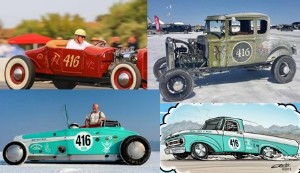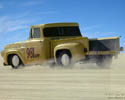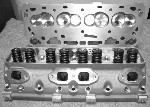|
Author
|
Message
|
|
jepito
|
|
|
Group: Forum Members
Last Active: 10 Years Ago
Posts: 87,
Visits: 541
|
A few things i have read, found at the track, and learned on the chassis dyno.
Its better to be a little big than a too small
Tri Y will have a broad torque curve, 4-1 makes the most peak power.
primary lengths should be equal.
the collector on a 4-1 should have a cone in the center of the primaries to help flow together as smooth as possible.
If exhaust temp changes then size/length may need to be changed. You are tuning a sound wave that is traveling though the exhaust gases. The speed of sound changes when the density of the air changes.
If you can't fit the ideal primary length then you can run 1/2 or 1/3 length. If 1/2 length you will be "in tune" twice in the rpm range, but with 1/2 the effect. this broadens the power range, but with less peak.
A straight through muffler will make more power than an intrusive one, even if the straight through is longer. Made 10hp more with an 18" super trap(with no baffle) than with a 4" shoenfeld. the super trap was also quieter.
|
|
|
|
|
mctim64
|
|
|
Group: Forum Members
Last Active: 6 Years Ago
Posts: 2.4K,
Visits: 5.0K
|
Charlie, your tastes are wide and varied to be sure. 
 God Bless. God Bless.  Tim http://yblockguy.com/ Tim http://yblockguy.com/
350ci Y-Block FED "Elwood", 301ci Y-Block Unibody LSR "Jake", 312ci Y-Block '58 F-100, 338ci Y-Block powered Model A Tudor
tim@yblockguy.com Visalia, California Just west of the Sequoias
|
|
|
|
|
charliemccraney
|
|
|
Group: Moderators
Last Active: Yesterday
Posts: 6.1K,
Visits: 442.9K
|
charliemccraney (3/17/2010)
The Pantera is on my list of cars to own one day. That, a Ferrari 308, a Porsche 914, and, the expensive one that I may never be able to afford, a Bugatti T57SC Atlantic. Other than that, I imagine it will be customs and hot rods.Why does my taste have to be so expensive? http://auto.freedomblogging.com/2010/05/06/ultra-rare-bugatti-could-be-worlds-most-expensive-car/33593/
Lawrenceville, GA
|
|
|
|
|
Y block Billy
|
|
|
Group: Forum Members
Last Active: 7 Years Ago
Posts: 1.6K,
Visits: 5.2K
|
Hmmm! Lots to think about here, I'm very curious as to the outcome of the header testing, paitently awaiting results.
 55 Vicky & customline 58 Rack Dump, 55 F350 yard truck, 57 F100 59 & 61 P 400's, 58 F100 custom cab, 69 F100, 79 F150, 82 F600 ramp truck, 90 mustang conv 7 up, 94 Mustang, Should I continue?
|
|
|
|
|
57FordPU
|
|
|
Group: Forum Members
Last Active: 3 Years Ago
Posts: 726,
Visits: 73.6K
|
Charlie,
After thinking about it, maybe the headers are the reason you didn't see any improvement last year with the new engine. Perhaps they are at their limit. Charlie Mc, You are very perceptive. Tim is just finishing a third new 258" Y for the brick. Today we discussed more chassis dyno runs and one of the comparisons will be different headers. Perhaps we will make Jerry C smile after all (remember, he wants me to toss these Sandersons). Ted's research will be closely scrutinized as well. Headers are one of the last frontiers that we have explored and perhaps we have had our priorities a little out of line. We will share any new positive data.
Charlie Burns Laton, Ca (South of Fresno)

BurnsRacing981@gmail.com
|
|
|
|
|
John Mummert
|
|
|
Group: Forum Members
Last Active: Last Week
Posts: 915,
Visits: 7.5K
|
Barry: The 1-3/4" to 1-7/8" headers I described were 4 tube step headers into a single collector. I think they worked okay because they were too short to really be "tuned" to any particular RPM during our dyno testing of 3000-6200. These headers showed quite a few peaks and valleys in the power curve but they were very small. When we tried a set of long tube headers there were fewer peaks and valleys but they were more pronounced. Regarding the Hedman style headers, they were 1-1/2" tri Y style that fit in a T-Bird. I think the flat top exhaust manifolds would have just as well. It seems that headers with 26-30" primary tubes will be tuned to RPM levels above 7000RPM so probably won't work well for street engines. Regarding flanges a local engineer named Jim Feuling used to make headers with a large oval cone that mated the flange to the primary tube with large end welded to the flange. His theory was that the exhaust would shoot right past the mismatch, but it would prevent reversion at low RPM. I just did a quick search on the web for Jim Feuling anti reversion exhaust and found some interesting things. His later design went in-line in the primary tube. Food for thought!
http://ford-y-block.com 20 miles east of San Diego, 20 miles north of Mexico 
|
|
|
|
|
BIGREDTODD
|
|
|
Group: Forum Members
Last Active: 10 Years Ago
Posts: 324,
Visits: 2.4K
|
John Mummert (3/17/2010)
The Hedman style T-Bird headers took a 339HP engine down to around 295HPJohn, What were the primary tube sizes on these headers? Was that a contributing factor?
Todd in Central California...about half way between Fresno and Sacramento
1956 Thunderbird - 1960 F-100 - 1961 Starliner - 1961 Imperial
|
|
|
|
|
charliemccraney
|
|
|
Group: Moderators
Last Active: Yesterday
Posts: 6.1K,
Visits: 442.9K
|
MarkMontereyBay (3/17/2010)
Hmmm....I am sitting here looking at the 1 1/2" ports on the Sanderson shorties I just purchased. Mine is a stock 57 312 other than MSD/Petronix and a newer Holley 4bbl. I am not sure these are any better than the 57 stock manifolds or worse.If they're anything like the truck headers they produce, they must be good for about 300hp based on Charlie's experience. They're probably fine for your 312. Charlie, After thinking about it, maybe the headers are the reason you didn't see any improvement last year with the new engine. Perhaps they are at their limit.
Lawrenceville, GA
|
|
|
|
|
569104
|
|
|
Group: Forum Members
Last Active: 4 Years Ago
Posts: 90,
Visits: 447
|
Charlie, I'm not even close to knowledgeable in this field but this thread has prompted a lot of reading. So, in attempt to help answer the tubing size issue, I found this from the Burns Stainless web site, part 4 of a 5 part series on welding headers. It can be found under their Technology header... "So, when fitting the header pipe at the head, it is critical that the exhaust pipe be either “port-fit,” or slightly larger (0.030” or less) than the exhaust port for proper flow. The top of the port is the most critical section as this is typically the place of highest gas velocity during blowdown. It is best that the header tube be oriented parallel to the top of the port. Also, we prefer that the transition from the port to the primary tube be as smooth as possible over at least the top 90 degrees. Some header builders prefer the “step” at the port reasoning that the step will minimize back-flow or reversion. If this method is employed, the step should only be used at the bottom of the port."... Also, from all my reading it appears for the RPM ranges most common to "street engines" the longer 36" primary tubes would be prefered. If you have the room.
  1956 F100 Big Window 309ci Y-block, 1956 F100 small window 272ci Y-block Greg. Mountains of North Eastern CA
|
|
|
|
|
MarkMontereyBay
|
|
|
Group: Forum Members
Last Active: 6 Years Ago
Posts: 733,
Visits: 3.8K
|
Hmmm....I am sitting here looking at the 1 1/2" ports on the Sanderson shorties I just purchased. Mine is a stock 57 312 other than MSD/Petronix and a newer Holley 4bbl. I am not sure these are any better than the 57 stock manifolds or worse.
57 Black Tbird 312/auto
|
|
|
|